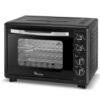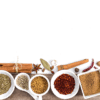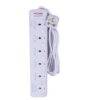
Tips of Using the Right Baking Tools
Baking is a kind of art that requires precision, patience, and the Right Baking Tools. From perfectly risen cakes to delicate pastries, the results of baking can be greatly influenced by the equipment used. Poor tools or low-quality bakeware can frustrate you and give disappointing results.
In ensuring that your baking tasks turn out right, it is very important to understand and use the right baking tools. This blog will give many important tips on choosing and using the right tools to achieve optimal results in your kitchen.
1. Quality Bakeware Should Not Be Overlooked
Baking pans, trays, and molds are the fundamentals behind every bake. It is very important to use high-quality bakeware for even heating the items being baked. Low-quality pans will only result in uneven cooking or burning. Heavy-duty non-stick pans are a must for most baking projects since they do not allow food to stick to the bottom and cook unevenly. Most people like non-stick coating since it minimizes greasing of the pan extra, hence cakes, cookies, and pastries come out clean.
While most people go for cheaper, flimsy bakeware, these tend to warp or even lose their shape over time. This may further lead to uneven cooking and far from perfect results. Therefore, durable, high-quality pans are worth investing in to ensure long-lasting use and better results.
2. Proper Measuring Tools Are Essential
Measurements when it comes to baking are more crucial than in other lines of cooking. There could be slight changes to your normal recipe, and this indeed will make a difference after the product is baked. Measuring cups and spoons should be used for precision in liquid and dry ingredients. Every baker in baking should have a set of stainless steel measuring spoons and cups.
Liquid ingredients are measured in liquid measuring cups with a spout. These commonly come in glass or plastic and have clear markings. Dry ingredients are measured in standard measuring cups with straight edges. These must be leveled off when full to avoid overuse of flour or sugar in a dough or batter.
3. Mixing and Whisking Implements for Efficiency
Mixing ingredients manually is time-consuming and can lead to inconsistent mixing. For those tasks that require heavy blending or beating, an electric mixer or stand mixer is necessary. These mixers are designed to ensure that ingredients are properly combined without overworking the batter.
While hand mixers are normally up to the task for small jobs, larger batches, and more sensitive mixtures deserve a stand mixer. Most models will come with several attachments whisk, a beater, and dough hook, that enable it to handle any given task in a snap. These save time and energy, with the result always turning out great.
4. For Non-stick Surfaces, Silicone Tools Are a Must
The most popular items that today’s baker will encounter are the silicone spatula, brush, and baking mats because of their non-stick nature. Silicone, being heat-resistant and pliable, makes it ideal to use with sticky dough, frostings, and batters. Silicone spatulas are perfect for scraping down bowls to ensure no mixture has been wasted.
The options you can use instead of parchment paper include a silicone baking mat. These provide you with a non-stick surface one can reuse a couple of times, saving on waste and eliminating greasing unnecessarily. These are basic tools for clean, professionally looking bakeries.
5. Thermometers Are Important for Precise Temperature Control
An oven thermometer is indispensable in the hands of any baker. Most ovens, even at the same set temperature, often end up with fluctuations in actual temperature levels, thus greatly affecting bake times and results. Oven thermometers help you make sure your oven temperature is accurate. That is extremely important, as some recipes require perfect temperature conditions for bread baking, candy making, or preparation of custards.
Another indispensable tool when working with sugar is a candy thermometer. The temperature readings would just be perfect to get the syrups and candies delicate, neither too soft nor too hard. For cakes and other baked goods, a food thermometer may be used to check for doneness, making sure internal temperatures reach the desired level for safety and quality.
6. Pastry Making-Rolling Pins and Dough Scrapers
For the pies, tarts, or pastries a rolling pin and dough scraper should be considered indispensable tools. A rolling pin allows for smooth, even rolling of dough without applying too much pressure; for this reason, the best rolling pins are typically made of either wood or marble, as they provide an ideal balance of weight and flexibility. Scrapers for the dough are utilized while managing sticky doughs. The tool is also used while portioning the dough or in moving the dough to a baking sheet. Its solid construction enables one to work on any texture of dough without attachment on the surfaces, and with much ease of movement.
Conclusion
Quality Tools Are a Worthwhile Investment But just like the ingredients, baking requires the proper tools to get the job done right. Quality bakeware, accurate measuring, efficient mixers, and multi-purpose silicone pieces will make all the difference in results and experience. You’ll find baking easier and more satisfying if you have the right tools for the job. The right tool for the job will get your baking just right, and you shall enjoy the fruits of your hard work in the form of delicious, expertly made treats.




